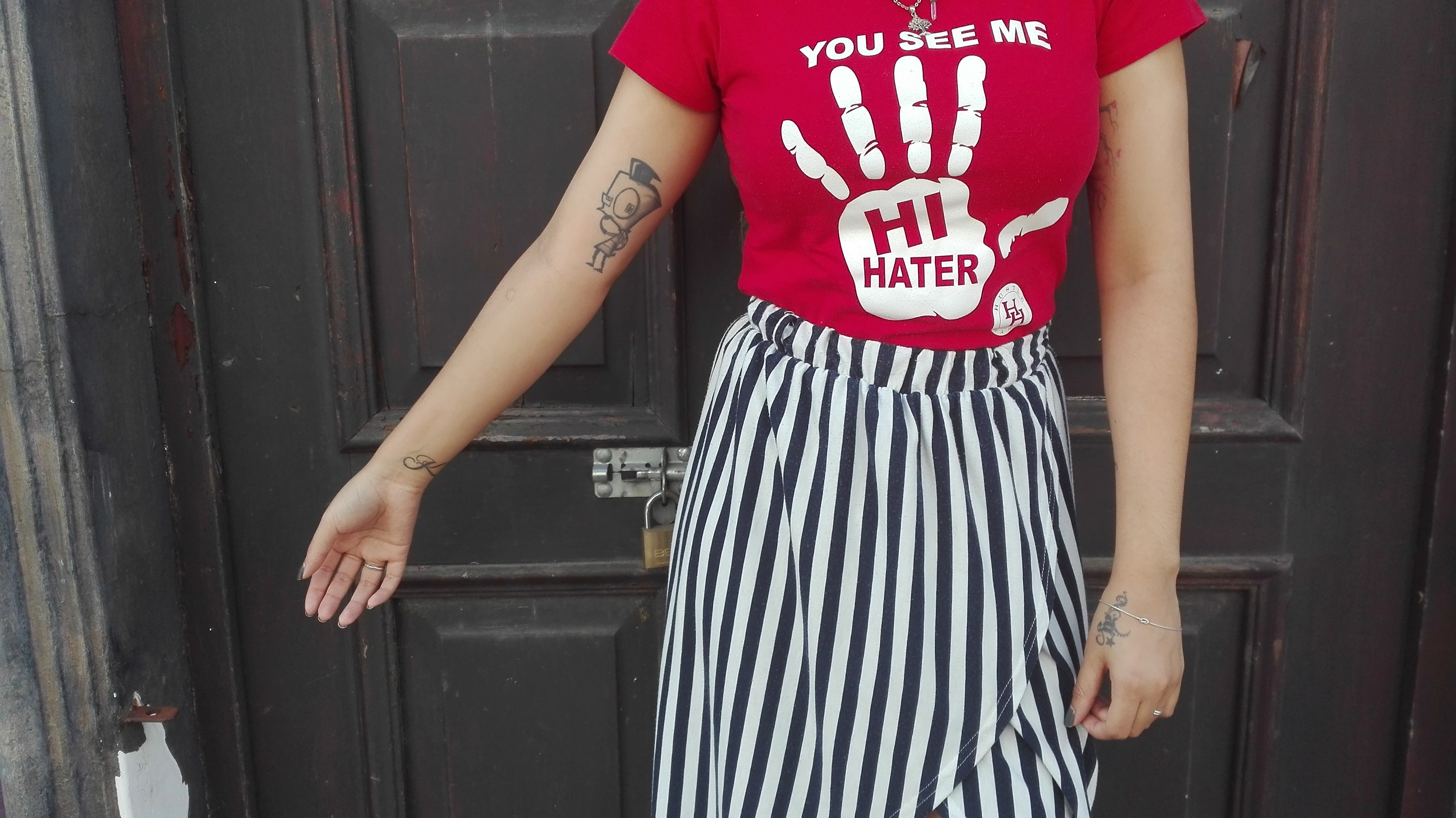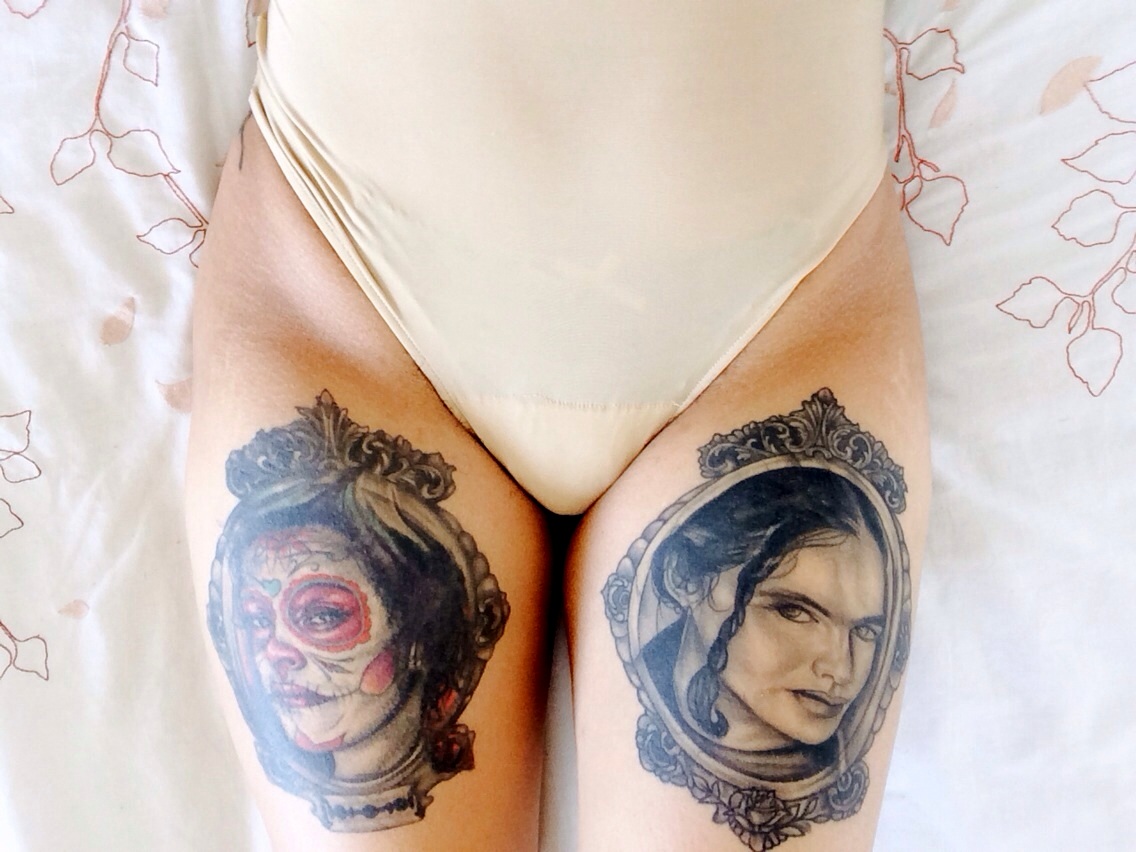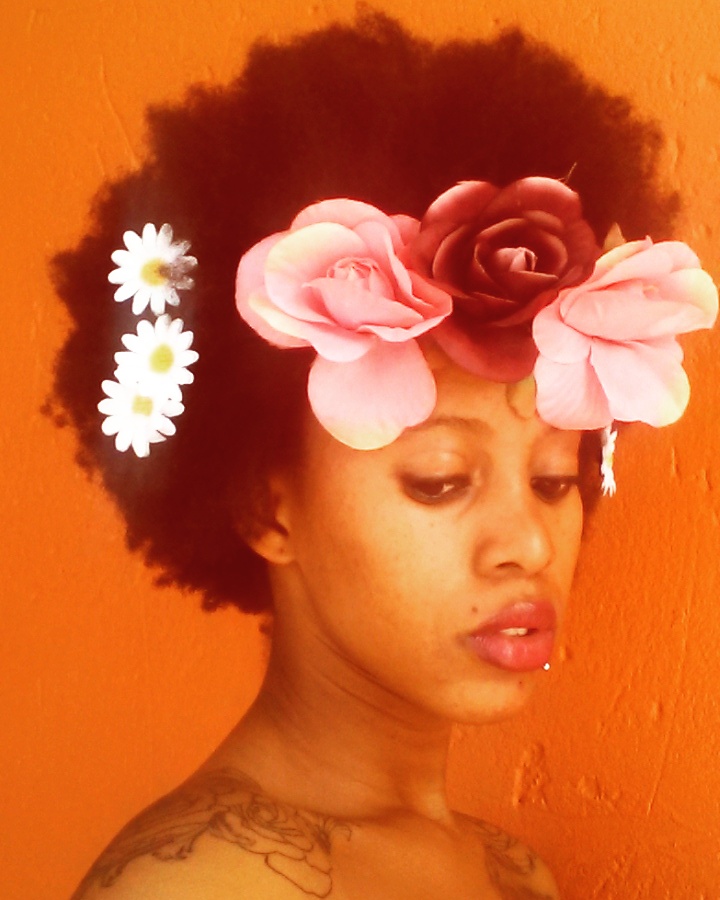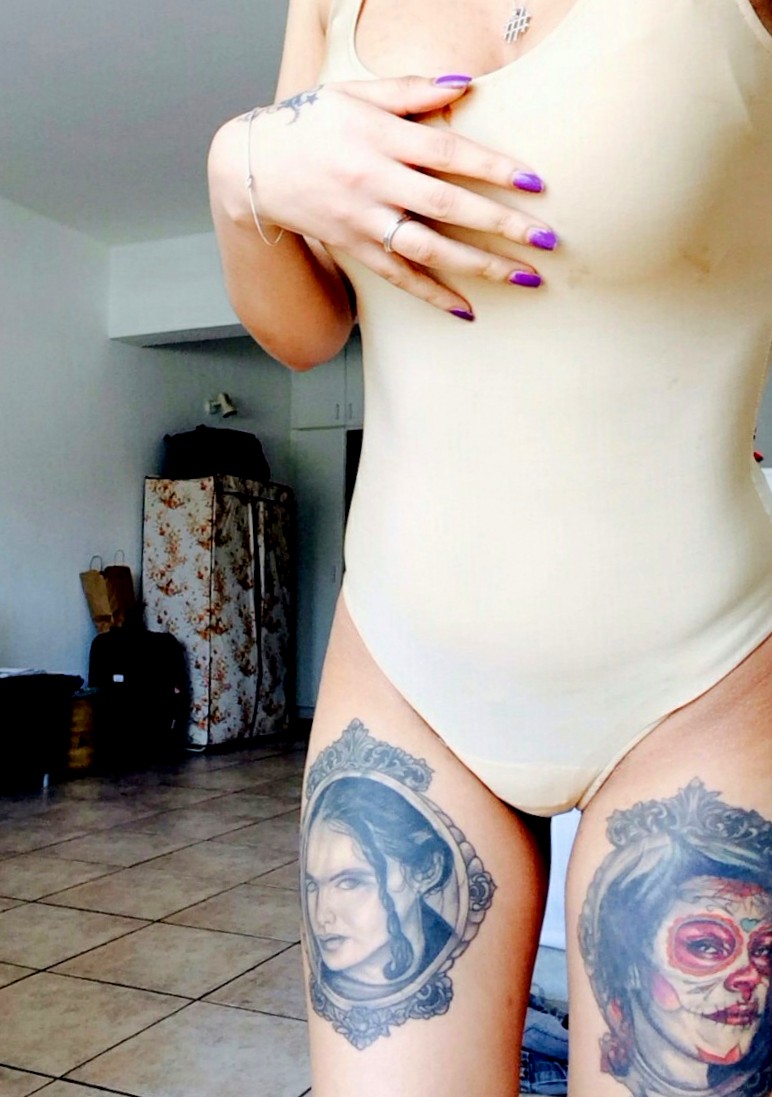The year’s 2004 and Lebo Mathosa is set to release her sophomore album Drama Queen.
Her video for her second single I Love Music features her in a red sari, belly dancing with her belly ring and ab tattoo on full display as she enunciates every word, and teases the viewer with glimpses of her tongue ring. Her long blonde hair flows as she twists and turns and I fall a little bit in love with every scene.
https://www.instagram.com/p/5fNIhhLINJ/?tagged=lebomathosa
She’s the first African woman I’ve ever seen proudly showing off her ‘western’ body art and I’m in awe.
I’d been taught that tongue rings and tattoos were the mark of loose women, corrupted by Western ideals. The body markings on African women I’d been exposed to at that time were usually tribal and often done without the woman’s enthusiastic consent.
The camera would zoom into the woman’s face as the translator related how their markings, which were once a source of pride, now got them ostracised in modern society. Proof yet again of the ever-struggling Africa that the world knows and loves to back up with jokes about starving kids and our sad women.
There was nothing beautiful about the women who modified their bodies.
Closer to home, we were taught that there was nothing beautiful about the women who modified their bodies of their own accord either. Most of us having been raised in Christian households, knew the importance of remaining as simple, and therefore as ‘clean’ as possible.
https://www.instagram.com/p/jzS4zXhrmR/?tagged=lebomathosa
The cleanliness wasn’t about hygiene at all. First it was about not doing anything that would suggest that you were unhappy with the way God made you – which apparently is flawless for he makes no mistakes – and second, it was about not being ‘too sexy’ so as to attract male attention because we all know where that leads.
My fear of being a good Christian woman, like my mother and those before her, began to ebb away.
Because it was, and to many people it still is, the woman’s job to keep men in line. Strange piercings and tattoos were looked down upon as a gateway to promiscuity. Men liked exotic things and if you changed how you look THAT drastically, you became an exotic thing.
At nine years old, watching Lebo gleefully glide across the screen, my fear of not being a good Christian woman, like my mother and those before her, began to ebb away. Up until that point, I had only rarely questioned what kind of woman I’d like to be.
Well, that’s not entirely true, I DID have a fantasy of what kind of woman I’d like to look like, hidden deep within to be lived out when I played with my Barbie dolls in front of our TV. I wanted to be blonde and blue eyed, named Alicia, just like Miss Silverstone in Excess Baggage. She could have numerous piercings because she had a freedom I didn’t, but when I saw Lebo I realised that the things I wanted in Alicia, I could get for myself, as Bakang from Botswana.
The Tumblr revolution – the time when many of us joined Tumblr and truly saw that we too, as black girls, could create our selves, and then proceeded to – happened in Southern Africa circa 2011/2012 and I finally got the confidence to not just pierce my nose, but my lower lip too.
I want to get more tattoos and a septum piercing next (the mark of the Woke Black Thot, if Twitter folk are to be believed – and a title I’ll carry well) because for me, I have finally learned that my body is for me to do with as I please. It is mine, one of the few things I truly have ownership and control over, and I hold on to that dearly.
A young black girl’s autonomy is a threat to many.
As I grow, I want to see my transition, my creation of self – not just mentally or emotionally, but physically as well. I want to create a life that I’m proud of, and my body is a part of that. It’s a personal thing – my body, my modification of it, my self confidence and esteem. They are all about me, and I’ve come to learn that to many outsiders, that is the issue.
A young black girl’s autonomy is a threat to many. Society fears women understanding and using their power. As a young black woman, you have the time and energy to grow, change and shake up systems that have been perpetuated by patriarchy and misogyny that were designed to keep us in line and servile – systems that serve everyone but us. And that is what everyone fears.
Alyx Carolus, a social-media manager and blogger based in Cape Town, and Lebohang ‘Nova’ Masango an anthropologist and poet based in Joburg, know all too well the highs and lows of taking ownership of your body as a modern-day young African woman – the freedom and frustration. I spoke to them about the inspiration behind their art, its significance to them and how they deal with the attention they get.
Growing up in a mainly Christian household, body modification was seen as taboo. A deviation from the norm and a gateway into promiscuity and whatever else came with not seeing your body as ‘the Lord’s temple’. Can you recall the first time you realised that your body was yours, truly yours? Who or what brought about that realisation?
Alyx: I had a similar upbringing, growing up with a Catholic background. I was constantly reminded that the female form was precious, meant to be untainted and left sacred for my potential husband. I only really felt my body was mine at around 18 years old.
I had left for varsity and was truly allowed to express myself as I pleased. I could wear what I wanted without terse comments from my family members or worrying what the church folk would say. It was around that time I started planning my first tattoo.
Nova: I owe the embrace of my autonomy to the discipline of dance. I have been a ballet dancer since I was eight years old and in my performing arts high school, I majored in dance, ranging from ballet to contemporary, jazz, Spanish and Afro-fusion.
For all those five years in boarding school, every day was spent dutifully facing myself in front of the mirror-covered walls. I would command and coax my body to be strong yet supple yet small yet larger than life yet soft yet tough yet flexible all at once. Endless 5-6-7-8-counts spent sweaty and being drilled in the ultimate mastery of the corporeal self.
Each time I managed to push myself harder into the splits, to stay balanced as I added one more turn to my pirouettes, to sustain my posture in pointe work and to flawlessly execute some new choreography made me feel incredibly powerful.
The infinite aches, the sweat, the blood, the injuries and the small, sweet everyday victories – the amount of determination and control that it all demanded out of me – really grounded me in my understanding, acceptance and loving of my body.
I approach the idea of my body with an immense amount of gratitude.
It has been quite a journey, carving beautiful movements and lithe form from stubborn and painful structure of flesh and bone. The great thing is that my passion drowned out all the ‘you’re too skinny’ and ‘real African women have big boobs and bums’ negativity that people occasionally tried me with.
I approach the idea of my body with an immense amount of gratitude – this is the only one I have and it houses my spirit beautifully. The way I see it, this small and precious brown body and I have been through too much for anybody to even think that they can even begin to tell me what to do with it.
Please tell us the journey to getting your piercings and tattoos. What did you get done, where on your body and why?
Alyx: I had been thinking about getting tattoos since I was 16. I’m pretty glad I didn’t start getting them so young, because I had no idea what I wanted then. In total, I currently have nine tattoos and seven piercings. My first tattoo was a line from TS Eliot’s East Coker on my right ribs. I wanted my first piece to be hidden (my grandmother didn’t approve).
My next two pieces were lettering. I got the words ‘AJ’ on my left hand in memory of my late best friend. I put her on my hand so she could be near everything I touch. I got ‘Make Yourself’ on my left wrist, the lyrics from one of my favourite songs.
I put her on my hand so she could be near everything I touch.
My fourth piece is a Japanese-influenced piece with a beautiful cherry blossom tree with a bird flying out of a cage. So many people love it and think it’s beautiful. It represented my freedom at the time and it still does. My fifth piece was a fun one: I decided to get Invader Zim on my inner-right arm, honestly, because his facial expression made me laugh.
My two favourites are the Mexican-inspired pieces on my thighs. I got my mom as a calavera (Mexican traditional make up usually portrayed on a skull) and my godmother as Frida Kahlo.
And my last two pieces are lettering tattoos. I got the letter K (in honour of another late friend) and the word ‘know that fate is what you make of it’ on the back of my left thigh. I love Incubus, and their lyrics continue to resonate with me long after I started listening to them.
Nova: I’ve always loved words and I began writing poetry in high school. I had a few notebooks that were spilling over with quotes from poems that had just gotten me over. You know, life things.
Tattoos have been my way of remembering valuable things.
I came across Alice Walker’s Did This happen To Your Mother? Did Your Sister Throw Up A Lot? and the last few lines, about how a woman must not compromise herself, hit me straight in my gut so I had to tattoo them on my arm.
Ever since then, tattoos have been my way of remembering valuable things. My second bunch was a quote about love and fear by Bassey Ikpi near my elbows and an important statement about poetry by Audre Lorde.
I have a Safia Elhillo line about dance and war on my left foot and a word that I know myself by on my left hand. I have a library on my right leg, a typewriter by my knee and a grand, feathered fan on my thigh – that is the leg sleeve that I currently have in progress. I also have some roses on my shoulders.
In between the tattoos, I have gotten some metal work done too. My first body mod was the piercing underneath the left side of my lip. I think I got it in 2008, when Lil Wayne, who inspired it, was truly poppin’. The septum ring was inspired by Together Again-era Janet Jackson with the red, curly hair. I have always loved her!
I do have more piercings but that is all that I will say about that.
The small fact that we have moles on our faces in similar locations made me believe even more that a septum like hers would suit me. In 2010, I finally got one and shopping for jewellery for it is still one of my favourite things to do. Of course, I do have more piercings but that is all that I will say about that.
For me, body modification is a way of claiming ownership of my body, of creating my Self. What does it mean to you, and why is it so important?
Alyx: Body modification helped me see myself in an entirely different manner. I’ve struggled with self-harm and disordered eating throughout my childhood right into my teen years. I harboured so much resentment to the way I looked and getting tattoos flipped the switch on that completely. I started to see my body as a blank canvas, a way to express myself in the manner I please.
It’s so important to be able to look at your body with acceptance – despite what you see in mainstream media. I never wanted to look like your typical Stepford wife and tattoos helped me define my identity. It was so important to rebel against the upbringing I had, find my own voice and getting art all over my body was the best way to do so.
Nova: For me, body modification is an extension of my creativity. The same way that I adorn my body with clothes and accessories is the same way that I adorn it with tattoos and piercings. It is indeed also a way of claiming ownership of my body. I find power in knowing despite how desperately this patriarchal society tries to limit my life choices to only those that will make me the best wife or mother in a strictly puritanical sense – I say fuck that and do exactly what I want with my body. Even better, I plan to be an awesome wife, mother, daughter-in-law and all of that with as many tattoos as I can get.
Black women are no longer bound by any specific ‘beauty’ ideal.
I love the fact that young African women are now expressing autonomy – the strong black woman is a tired trope, it’s usually about us taking abuse from other people, however I believe that we display immense internal strength and confidence to face a society that WILL shun, judge and harass us, for being ourselves and loving ourselves – creating ourselves. What are your thoughts on the recent wave of body modification that seems to have swept us all up? What do you think it symbolises for us and the current mind state of our peers?
Alyx: I love it! My fascination with body modifications led me to plenty of alt. model sites like Suicide Girls and I always yearned to see more women of colour looking heavily tattooed or pierced. I see so many black women who are completely fearless with their body mod choices and it gives me hope.
The more of us there are, the more visibility there is in mainstream society. I think it really showcases how black women are no longer bound by any specific ‘beauty’ ideal and choose to navigate their identity as they please – meaning that body mod could soon be the norm instead of a novelty.
One’s personal space is bound to be invaded. Most recently I had a strange guy I don’t know at a party reach out and pull my lip ring to ‘check if it’s real’. I’ve even had men grab me by my neck ‘just to see’. Could you please speak on your experiences with street harassment and personal invasion and how you tackle that in your everyday life.
Alyx: I get harassed every time I wear a pair of shorts or a form-fitting dress. I cannot tell you how many times a man has invaded my space to tell me ‘Girlie, I like your tattoos.’ Bear in mind, no one says anything when I wear a short sleeve shirt. I only get harassed when I reveal my thigh pieces.
I usually just tell men to fuck off and the women not to touch me.
I’ve had men stop, crouch down and stare as I walked on the street. Some have simply crouched right next to me while I stand to get a closer look. It’s infuriating. I usually just tell men to fuck off and the women not to touch me. It’s why I try and cover up in summer just to avoid the bullshit.
Nova: Oh, my goodness. Street harassment is the bane of my existence. I think what makes it so much worse for me is that I absolutely cannot get used to it. I am genuinely horrified and indignant at humanity every time it happens.
You’re telling me there are this many women on the planet and yet you’re still going to act out so bizarrely every time you see one?! Can we live, already? Sure, the kinds of tattoos I have may be interesting or rare but that does not excuse the yells, whistles, exclamations of disgust and ‘I wonder whose child this is’ that follows me in public spaces.
How I deal with it varies. The thing is, it all depends on my risk assessment. My personal preference is to never leave that kind of situation without defending myself. Walking away and feeling like ‘I could have stood up for myself’ is a crappy feeling so I try to avoid it at all costs. On the other hand, we know that South African men – especially black men as the people mainly responsible for violating me in the streets – are capable of remarkable violence against black women.
https://www.instagram.com/p/_9b60ZNgfe/?taken-by=heyalyx_&hl=en
Therefore, I usually ignore it. Sometimes, I draw myself up to my full height and swear at the person, usually a ‘don’t look at me like that’, a ‘v’tsek!’ or just a middle finger while maintaining eye contact. My favourite and least energy-consuming one is when someone, usually other women, look me up and down and I then look at them squarely in the eyes. Human beings can’t handle being looked at directly like that in public so the reactions always make me giggle inside.
What’s your favourite piece/piercing right now, and what is on your body mod bucket list?
Alyx: My favourites are my portraits, mainly because they look a little bit sinister. I love the fact that I have these women gazing out to the world, on my thighs. I’d like to get my nipples pierced, once I work up the courage.
I’m planning one more piece in 2016 – a single oleander on my sternum, referencing one of my books and movies, White Oleander. The ultimate treat would be getting tattooed by Kat Von D or Nikko Hurtado. They’re both unbelievable artists.
Nova: The books on my right leg are still my favourite piece. My bucket list is filled with many things – there’s a Lucille Clifton quote that I still need to get. I would like to turn my right leg tattoos into a complete sleeve and I still would like to get a cuff on my right arm.
When I have babies, I look forward to getting their names tattooed on my palms.
When I have babies, I look forward to getting their names tattooed on my palms. I don’t believe that getting tattooed is painful, but the one on my left hand was something else because of how sensitive our palms are. I could do that for my babies.
The sudden wave of tatted up, big haired or bald, young black women whose skin glistens with the sheen of coconut oil and silver and gold carefully placed to their liking all over their bodies marks the beginning of an era, of a generation of women who will fight as hard for themselves as they have for everyone else.
As much as there are revolutions going on all over – clashes between the people and The Man, the man and the woman, there’s one going on inside our own yards, against our mothers and sisters and aunts who never learned to see themselves beyond the gaze of the church and their husbands and their co-workers and their mothers.
Women who saw themselves as everything but themselves – faceless women, who will go down as martyrs to unknown and flimsy causes, and nothing more, who however had the privilege to birth women who are ushering in a wave of African women with names, faces worth remembering and identities that don’t paint them as poor black women and martyrs to a cause.
These African women will decide to live their best and most honest lives, will be known, not because of their struggles, but because of their identities – a luxury now, but really a right that African women haven’t truly had until now. Through the internet, where sisterhoods are formed and #aestheticgoals are set, young African women can now not only be inspired, but inspire those without these luxuries to live their truth too, in action and in word.








